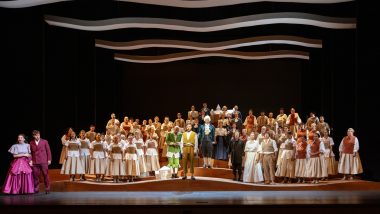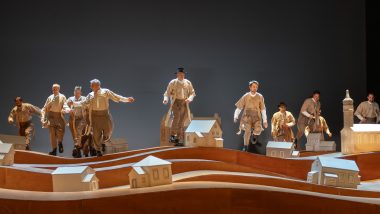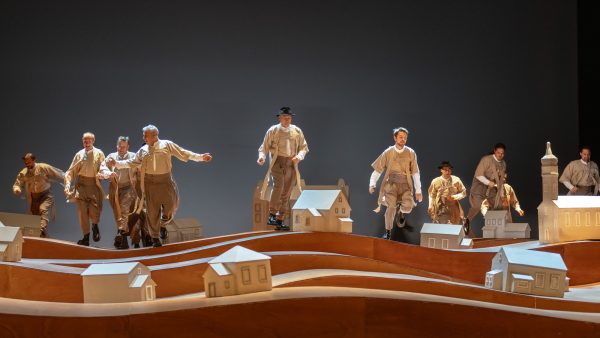 Czech Republic Dvořák, The Jacobin: Soloists, Dancers, Children’s Choir, Chorus and Orchestra of the Janáček Theatre Brno / Jacub Klecker (conductor). National Theatre Brno, 26.11.2023. (GT)
Czech Republic Dvořák, The Jacobin: Soloists, Dancers, Children’s Choir, Chorus and Orchestra of the Janáček Theatre Brno / Jacub Klecker (conductor). National Theatre Brno, 26.11.2023. (GT)

Production:
Director – Martin Glaser
Scenery – Pavel Borák
Costumes – David Janošek
Lighting – Martin Špetlík
Choreography – Martin Pacek
Dramaturgy – Patricia Castkova
Chorus director – Pavel Konarek
Children’s Chorus director – Valeria Mat’ašová
Cast:
Count Vilém of Harasova – David Szendrich
Bohuš – Roman Hoza
Julie – Pavla Vykopalová
Adolf – Tadeáš Hoza
Filip – Jan Šťáva
Jiří – Aleš Brisein
Benda – Petr Levíček
Terinka – Lucie Kankova
Lotynka– Jitka Zerhauová
Antonín Dvořák is most acclaimed for his Cello Concerto, the last three symphonies and the Slavonic Dances – but how many of his eleven operas are heard? As the composer wrote at the beginning of his career: ‘One of my greatest goals was to write an opera.’ Only the delightful Rusalka has entered the repertoire of opera companies for its fairytale libretto and the aria ‘Song to the Moon’. The Jacobin was his sixth opera written in tandem with a different stage work, Dmitrij in the early 1880s. While the latter is based on historical legend, The Jacobin is a rustic comedy inspired by the composer’s childhood, yet with political undertones. Owing to the many rewritings of the libretto by Marie Červinková-Riegrová, the opera was not completed until 1888 and then revised again in 1897.
Based on the librettist Jeřábek’s ‘At the Ducal Court’, Dvořák’s opera was first called The Welcome, albeit the plot was virtually the same yet with different names for the main characters, the second version was called The Arrival of the Gentry, or The Lords’ Arrival. The final version is based on the times of the Jacobin reign of Terror of 1793, which gave the plot a political input and to the characters in the opera.
The composer decided to write the opera, ‘for my own delight and my personal pleasure.’ Episodes from Dvořák’s childhood; the village church in Zlonice, and the children’s choir are prominent in ensuring the opera’s success among Czech audiences. The final version of The Jacobin premiered in June 1898, and it has been performed widely in Europe, including at the Welsh National Opera, the Edinburgh Festival, the Buxton Festival, and in a concert performance by the BBC Symphony Orchestra in 2012 under Jiří Bělohlávek. The opera has been popular in the Czech lands, especially in Brno, where it has been staged in sixteen different productions.
The plot is about a nobleman’s son – Bohuš, who left to join the French Revolution and was disowned by his father, Count Vilém, and returns after being sentenced to death by the Jacobites. There is also the narrative of the failed courtship of the foolish Burgrave with the charming Terinka, and at the core is the characterisation of the village folk in bringing out all the humour and faithfulness of their lives. Yet the village is under Count Vilém, whose rule is harsh and repressive, and the arrival of the outsider (Bohuš) represents a threat to village life. Of importance is the prominent role of the women in the opera; they dominate almost all the scenes and have the best arias. Dvořák was aware of Austria’s autocratic rule over Bohemia and the constraints on Czech language, culture and economy. Martin Glazer brings out the sentimentality of the work, offering a suggestion of the life of Bohemian village people, and he is helped by Dvořák’s richly colourful harmonies using folk song tradition with the dancing and festivities on stage, making each scene entertaining. The Jacobin is one of the composer’s most successful operas alongside Rusalka, Dmitrij, The Devil and Kate and Armida.

The standards of the Brno Opera were made clear by staging two quite different operas on successive evenings with different casts. The sets were minimal – yet they effectively facilitated the stage movements. The opening scene depicted countryside with little model houses on an undulating surface (possibly representing hills) and the church in the background; the colour scheme was bright yellow and orange, with a blue background, and the staging was raised and lowered to suit the choreography and the scenes in all three acts. The costumes were appropriate for certain characters – a clumsy fitting green attire for Filip, the foolish Burgrave – while the yellow-attired Adolf made him look like a country bumpkin, and Bohuš’s clothing was an ill-fitting purple suit.
The opening brief overture is festively rustic, emphasised by the brass with its harshly expressed pointed rhythms, and the curtain opened to show children bringing on the model houses to decorate the scene. An offstage choir sang plaintively, ‘Our heads are bent low in the dust’, accompanied by an organ as Bohuš and his French wife Julie entered. Bohuš sings, ‘Do you hear that? Czechs singing! Ah, that beautiful sound’. Roman Hoza’s baritone as Bohuš was clear and warm, albeit at one point he was a little overwhelmed by the orchestra – while the brightly lyrical soprano of Pavla Vykopalová as Julie was exceptional.
At the centre of the action is the rivalry for the hand of Terinka between Filip the Burgrave, played with fine acting by the bass of Jan Šťáva, and the young gamekeeper Jiří, who betters him both in dexterity and wit. The conflict comes to a close as the Count arrived – welcomed by a little inflated pompous choral finale at the end of the first act – ‘Oh, we welcome our new Lord!’
It was the two sopranos of Terinka and Julie who were the standouts of the evening. Of the male voices, Aleš Brisein’s tenor as the young gamekeeper Jiří was a strong contender for the best singing and acting. This was especially in his wittily expressed ‘You know this man!’ when accusing his rival Adolf, the sinister nephew of the Count, of discrimination and singing of freedom and a better life invoking the ideas of the French revolution.
The plot was easy to understand by the choreography on stage and the exceptional acting by the main characters. Dvořák’s music ranged from the richly colourful orchestration of his finest years to the psalmic chorus of the opening scene, and the orchestral playing suitably evinced all the magic of the score masterfully directed by the Brno-born Jacub Klecker.
The opening of the second act shows the rehearsal of the schoolteacher Benda’s cantata with the children. Again, this episode manifests the kinship with the Czech character and language which is at the heart of the opera. The children’s chorus singing Benda’s serenade ‘O hail our Lord’ is delightful and splendidly performed, with the mixed chorus of the villagers joining in the children’s singing. Petr Leviček’s finely characterised schoolmaster Benda comically implores the children to learn his music. Among the other highlights is the duet of Jiří and Terinka singing ‘Glory to the new Lord’, especially notable is Lucie Kankova’s portrayal of Terinka, and after everyone has left, her lovely solo aria, ‘Hail, Lord’ and her singing ‘O father, you have no sympathy for my love’. The duet between Bohuš and Julie, ‘We have roamed foreign lands’, was outstanding in both singing and acting, and in revealing their plight ‘We have worked hard and known great hunger’, yet this scene was surpassed gloriously by Julie’s delightful, ‘In autumn’s hazel grove, love no longer gives glory!’
Act III takes place in the Vaulted Hall of the Castle – where we discover that Bohuš was no Jacobin – instead, he is a Girondist on the run. Julie appeals to the Count to forgive his son by disclosing that he was sentenced to death by the Jacobites in Paris and only escaped to return to his home. Accompanied by a gorgeous folk-inspired harp melody and touched by Julie’s singing, ‘O forgive me, kind sir!’ the Count forgives his son and forsakes his chosen successor Adolf and is finally reconciled with Bohuš and leaves everything to him and Julie. Finally, the opera closes with the villagers dancing a polka and singing joyously, ‘The empty halls are full again!’ in a great celebratory chorus of happiness and joy.
This was a hugely enjoyable production that revealed the excellence of the Brno opera company. The staging by Martin Glaser brought out all the warmth and harmony which is so typical of Dvořák’s finest creations and most importantly his great humanity and empathy with his fellow Czechs. The audience’s love for this opera was evident and many of them watched and listened intently as if every word and phrase mattered to them. It was a full house, and the performance was rewarded by a standing ovation at the close. This production can currently be seen on OperaVision.
Gregor Tassie
